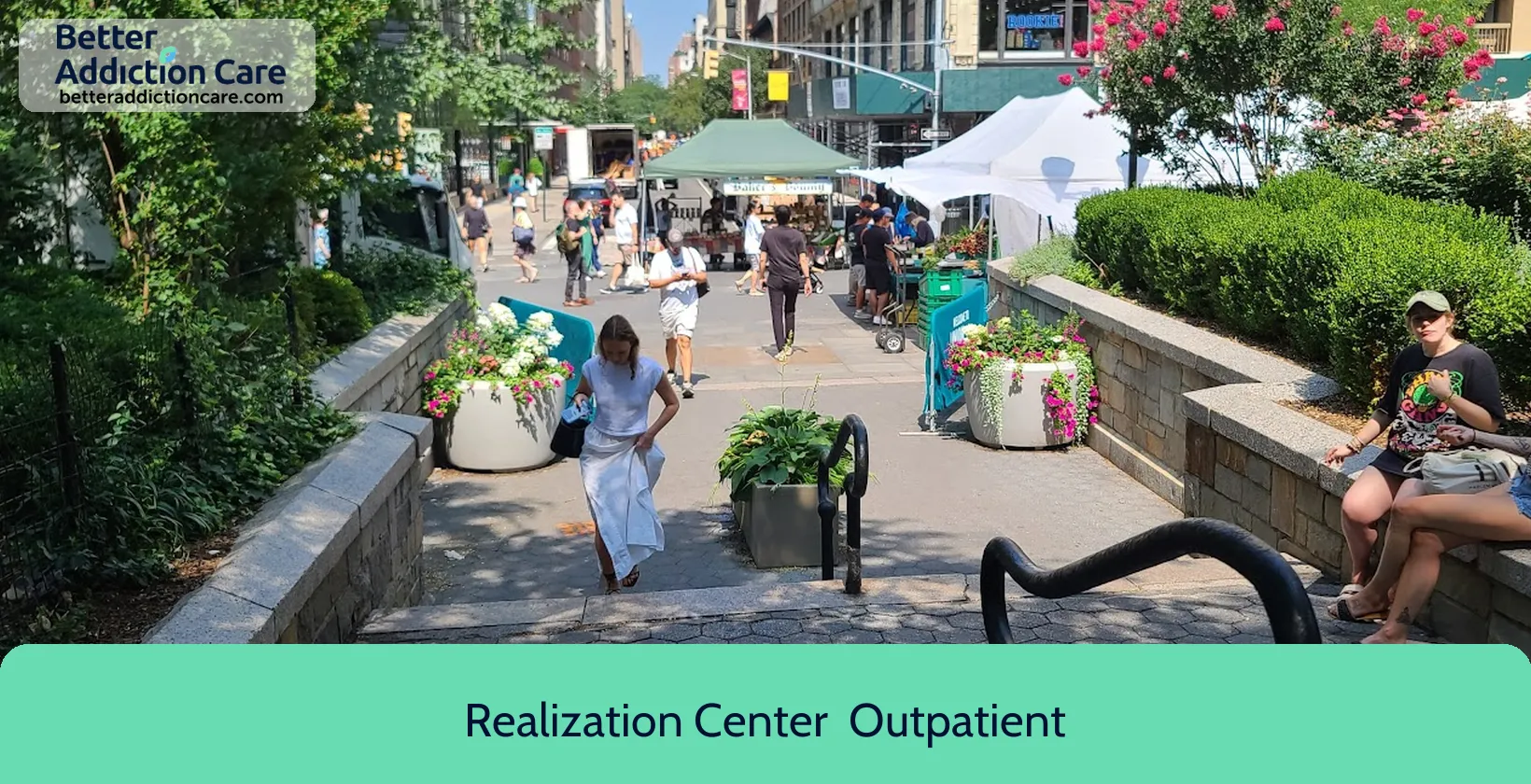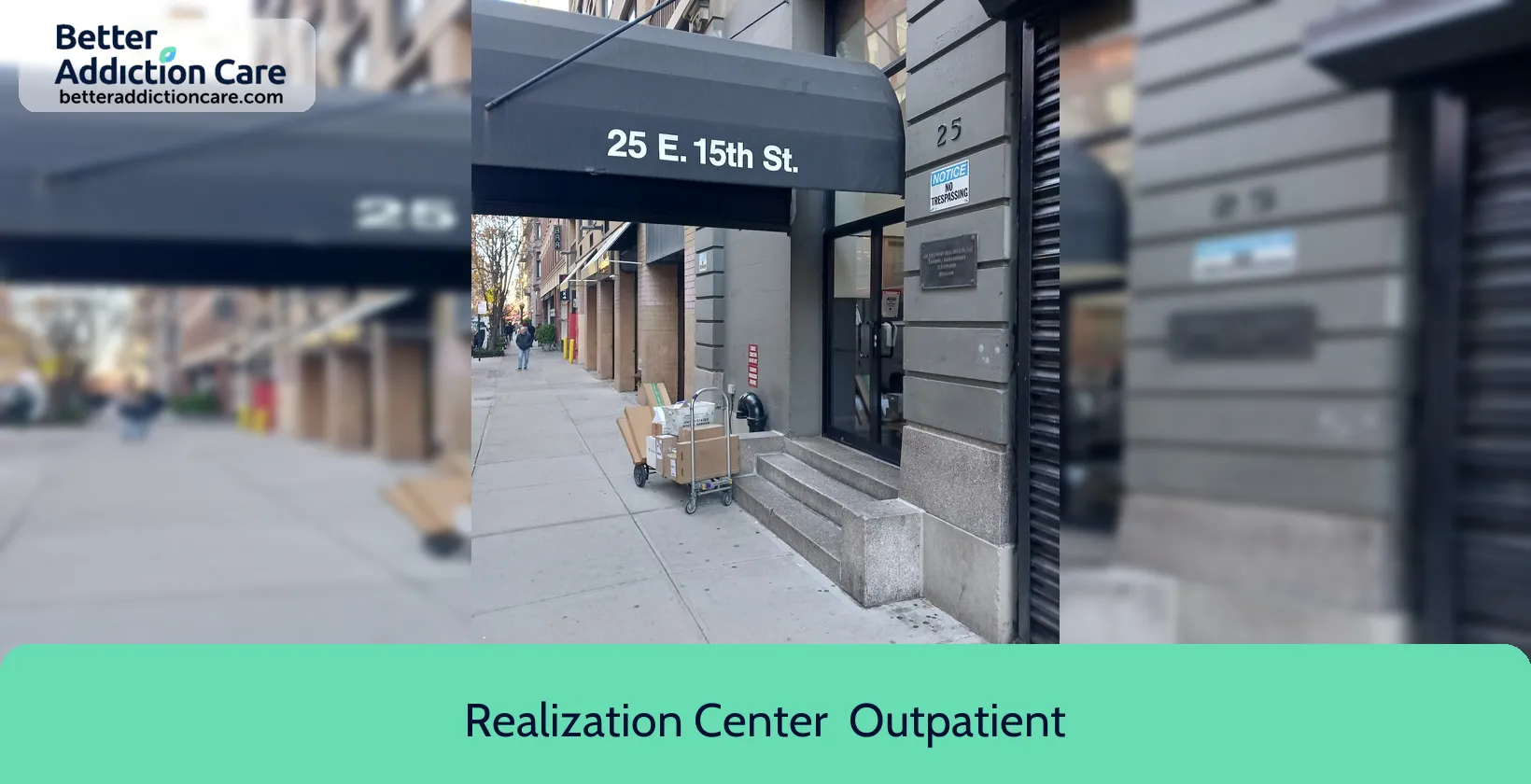Realization Center - Outpatient
Overview
Realization Center is a distinguished outpatient addiction treatment facility situated in New York City. The center has become one of the most established and largest programs in the city, providing comprehensive treatment for individuals who are currently struggling with substance use disorders and co-occurring mental health issues, with over three decades of experience. The center's primary objective is to deliver individualized, high-quality care that is tailored to the unique requirements of its clients in a compassionate and supportive environment.
The center's extensive array of outpatient services is centrally located at this location. Intensive outpatient treatment is available for individuals who require additional support beyond standard outpatient care, and the center provides a variety of care levels, such as partial hospitalization programs that enable clients to return home on a daily basis while receiving intensive treatment. Additionally, outpatient services are adaptable and can be scheduled to accommodate the schedules of individuals, offering both individual and group therapy sessions.
Specialized treatment programs are provided by the Realization Center to cater to the distinctive requirements of a variety of populations. These encompass programs that are specifically designed for adolescents aged 13 to 17, with an emphasis on supportive therapy groups, alcohol and substance education, relapse prevention, and anger and stress management. Furthermore, the center offers specialized services to the LGBTQ+ community, which are designed to address the unique challenges that this demographic encounters. Realization Center also offers veterans targeted care, with programs that concentrate on the distinctive mental health and addiction challenges they frequently encounter. Additionally, the center provides integrated treatment for individuals who are coping with both substance use and co-occurring mental health disorders, thereby guaranteeing a comprehensive approach to care.
At the Center, the therapeutic approaches are evidence-based and consist of Cognitive Behavioral Therapy (CBT), which assists clients in recognizing and altering negative thought patterns and behaviors, and Motivational Interviewing, a client-centered approach that increases motivation for change. In addition to its treatment program, the center also integrates 12-Step Facilitation to promote ongoing support during the recovery process by encouraging participation in 12-step programs. The facility is a licensed outpatient center that has been accredited by the state of New York.
Realization Center - Outpatient at a Glance
Payment Options
- Cash or self-payment
- Medicaid
- Medicare
- State-financed health insurance plan other than Medicaid
- Private health insurance
Assessments
- Screening for tobacco use
- Comprehensive mental health assessment
- Comprehensive substance use assessment
- Interim services for clients
- Outreach to persons in the community
Age Groups
- Seniors or older adults
- Adolescents
- Young adults
- Children/adolescents
Ancillary Services
- Case management service
- Suicide prevention services
- Specially designed program for DUI/DWI clients
- Domestic violence services, including family or partner
- Mental health services
Highlights About Realization Center - Outpatient
7.48/10
With an overall rating of 7.48/10, this facility has following balanced range of services. Alcohol Rehabilitation: 8.00/10, Drug Rehab and Detox: 7.85/10, Insurance and Payments: 6.00/10, Treatment Options: 8.06/10.-
Treatment Options 8.06
-
Alcohol Rehabilitation 8.00
-
Drug Rehab and Detox 7.85
-
Insurance and Payments 6.00
Treatment At Realization Center - Outpatient
Treatment Conditions
- Alcoholism
- Mental health treatment
- Substance use treatment
- Co-occurring Disorders
Care Levels
- Outpatient
- Outpatient methadone/buprenorphine or naltrexone treatment
- Intensive outpatient treatment
- Regular outpatient treatment
- Aftercare
Treatment Modalities
- Cognitive behavioral therapy
- Telemedicine/telehealth therapy
- Substance use disorder counseling
- Trauma-related counseling
- Smoking/vaping/tobacco cessation counseling
Ancillary Services
Languages
- Spanish
- Other languages (excluding Spanish)
- Greek
- Hindi
- Korean
Additional Services
- Pharmacotherapies administered during treatment
- Mentoring/peer support
- Breathalyzer or blood alcohol testing
Special Programs
- Clients with co-occurring mental and substance use disorders
- Criminal justice (other than DUI/DWI)/Forensic clients
- Pregnant/postpartum women
- Clients with HIV or AIDS
- Clients who have experienced trauma
Get Help Now
Common Questions About Realization Center - Outpatient
Contact Information
Other Facilities in New York City

7.08

6.59

6.65

7.08

6.71

7.43

7.54

7.08
DISCLAIMER: The facility name, logo and brand are the property and registered trademarks of Fortune Society, and are being used for identification and informational purposes only. Use of these names, logos and brands shall not imply endorsement. BetterAddictionCare.com is not affiliated with or sponsored by Fortune Society.


